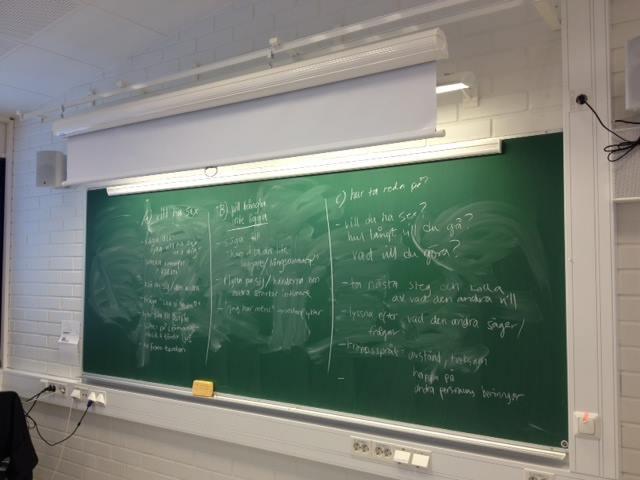Fair Sex workshops are tailored to respond to the needs and realities of students in the second year of the upper secondary school, which includes the age group of 16-17 years old. Fair Sex workshops have also been adopted for students with intellectual disabilities who are involved in a special vocational training program at the upper secondary vocational school on Åland. Since the spring in 2015, workshops are also available for students in junior high school. Apart from Åland, workshop leaders have been trained and the concept of Fair Sex workshops has also been introduced in the mainland Finland.
The methodological approach used for conducting Fair Sex workshops is based on the principles of equal participation, active listening, respect for diverse points of view and personal integrity. The workshops are interactive and inclusive, encouraging all students to reflect upon their own perceptions as well as general attitudes, society norms and values regarding sexual situations and sexual behavior. Fair Sex workshop setting is not an arena for discussing one’s own sexual experiences – it is a discussion forum for exchange of ideas and thoughts where all students, regardless of their previous experiences, can participate on equal terms. Different ways of communicating one’s consent or refusal to engage in sexual activity, grey area between consensual sex and sexual violence, depictions of sex in pornography, popular culture and media as well as the strategies for preventing sexual assault or rape are some of the core topics discussed in the workshop, which is divided into two 75-minute sessions, 50-minute sessions for the concept adjusted for younger students.
Workshop leaders always work in couples and having completed 8-hour of training followed by an obligatory practical session that includes observation of two workshops facilitated by experienced workshop leaders. The practical part is important for getting a better understanding of how the discussion may evolve in a group of students and how it might be influenced by personal attitudes and values of workshop leaders. There are no formal requirements regarding the age of workshop leaders, however, it is preferable that the leaders are within the age range that allows the students to relate to their life situation, but a few years older than the participants in order to establish authority in the classroom. This is also important for strengthening the impact of the key message on the audience, which emphasizes the importance of understanding one’s own preferences, communicating one’s desires and learning about the needs and wants of a sex partner.
In order to facilitate a discussion in a group of students, a number of drawings and drawing series have been produced specifically for the project and are used as an integral part of the Fair Sex workshop. The drawings serve as a powerful visual tool for initiating a reflection on a variety of potential sexual situations and actions that may be taken. Some situations covered in the drawings include nagging for sex, confusion caused by the use of euphemisms in sexual situations, pitfalls of assuming consent to sex on the basis of past sexual behavior or passivity of partner, gendered expectations regarding sexual behavior patterns etc. The use of visual material, which is partly humoristic, also helps the students to distance themselves from their personal experiences and to analyze the situation from a third party perspective. Moreover, the use of visual material injects some lightness into what otherwise can be perceived as a difficult subject matter. Overall, the general tone of the workshop is relatively positive in a way that it encourages students not only to reflect on situations involving potential sexual misconduct, but also on conditions for pleasurable and responsible sexual experiences.
The values clarification exercise is another method that is included in the workshop set-up, allowing the students to reflect upon their own thoughts and feelings and formulate their opinions. For example, the students are asked to take a standpoint on such statements as “Pornography can encourage people to try out things that they are not ready for”, “It is easy to express one’s willingness to have sex”, “Films and TV series can influence people’s view on relationships” etc.
Throughout the project implementation period, group discussions and discussion exercises have received a highly positive response in the evaluation questionnaires for students that are given out in the end of the second workshop session. Many of the students have also indicated that they had appreciated the possibility to talk about sex in an open and non-judgmental way and to listen to the thoughts and arguments of others. Based on the response from the students, self-reflection and evaluation by workshop leaders as well as new practices and theories in the field of gender equality and norm-critical perspectives in education, the workshop material has been continuously updated. For example, the way of approaching the rape issue has been revised a number of times in order to provide young people with a better understanding on what rape actually is as defined in the Criminal Code of Finland, but choosing not to put an extensive focus on this issue in order to leave space for discussion on other grey areas in sexual situations. The training of workshop leaders has also been updated to include a clear norm-critical approach to sexuality and sex, which is of great importance for creating an inclusive and open discussion climate in the group.





